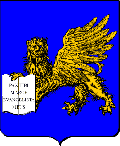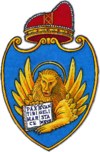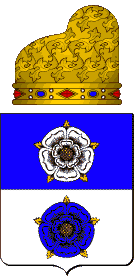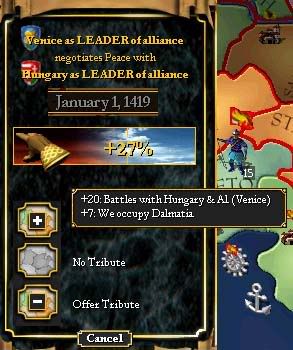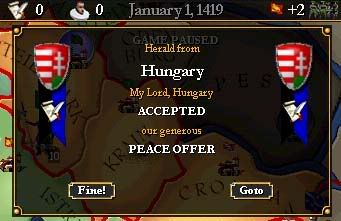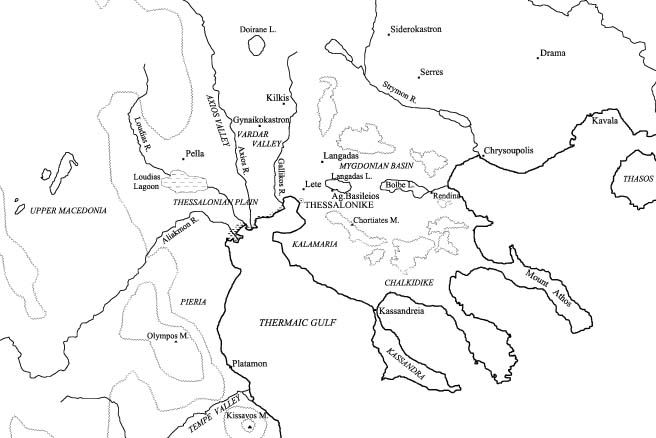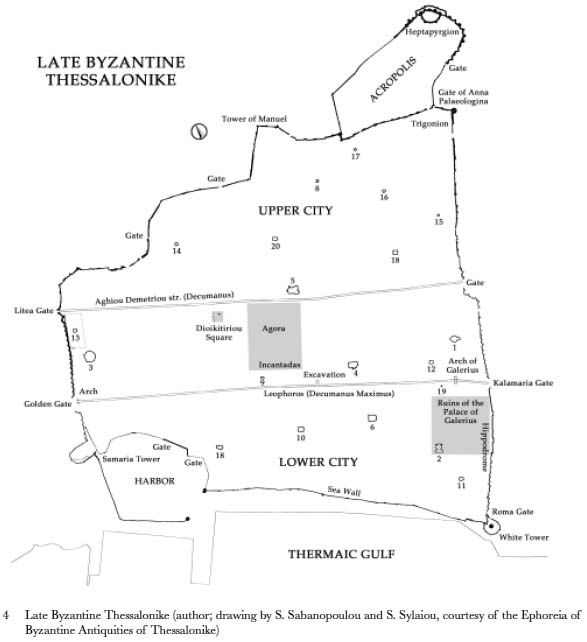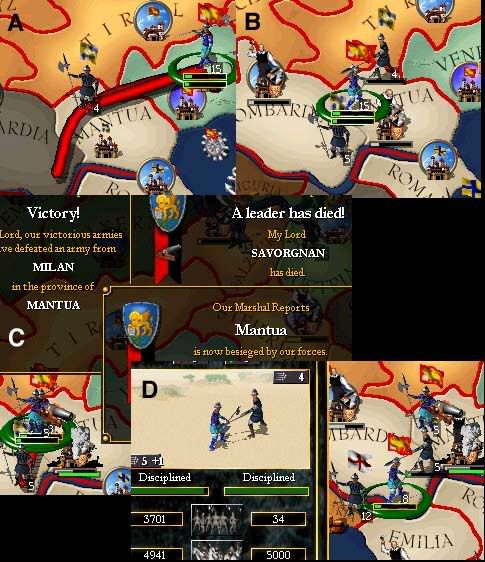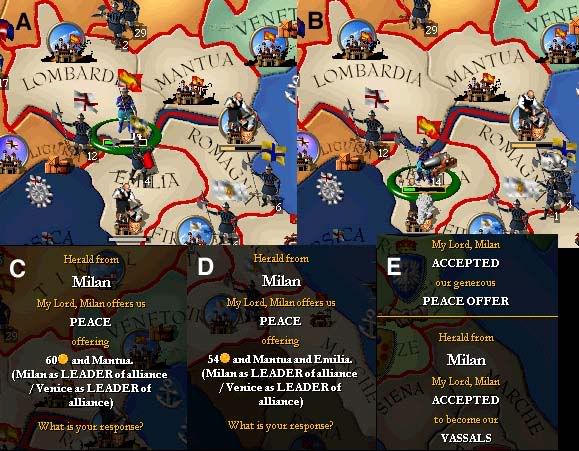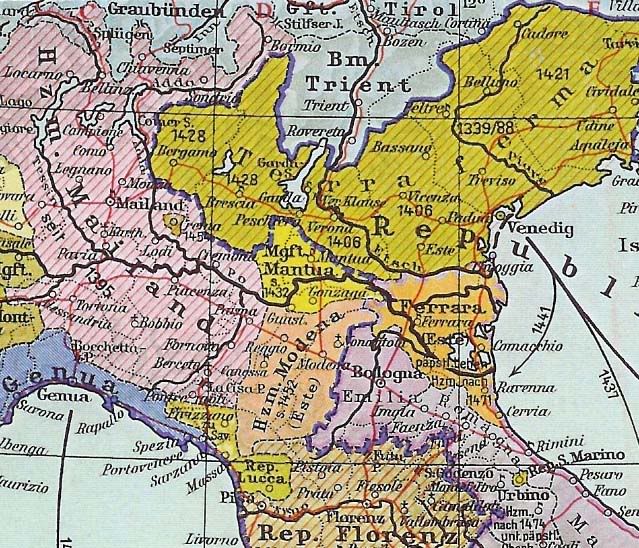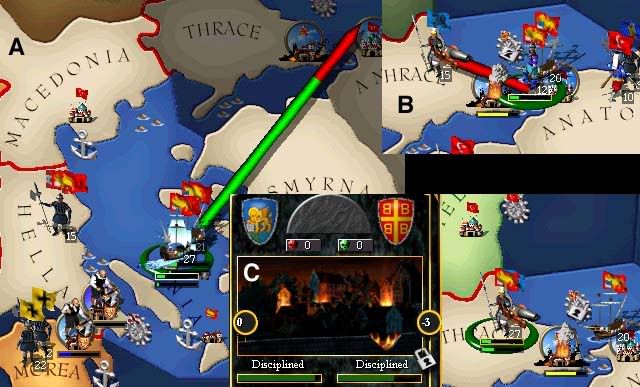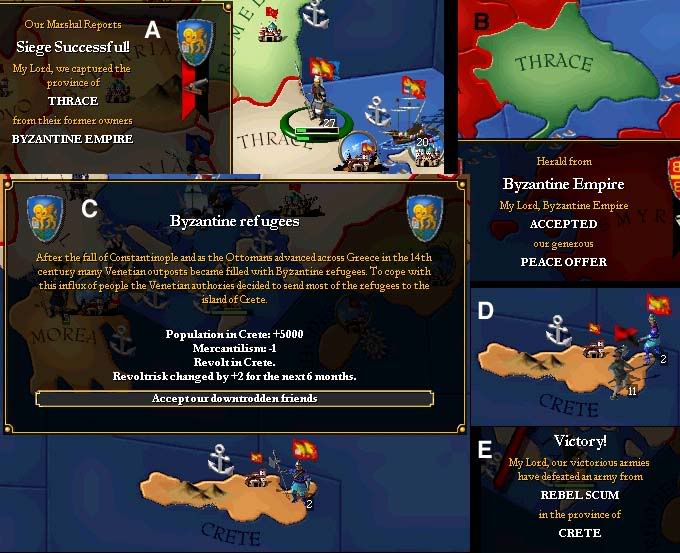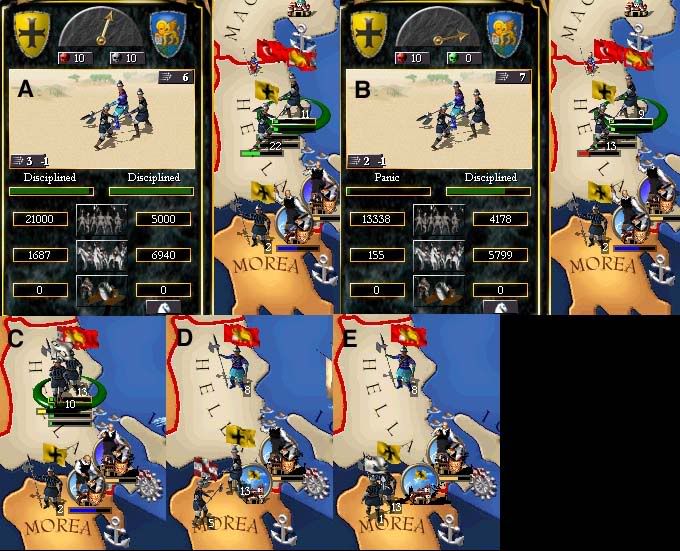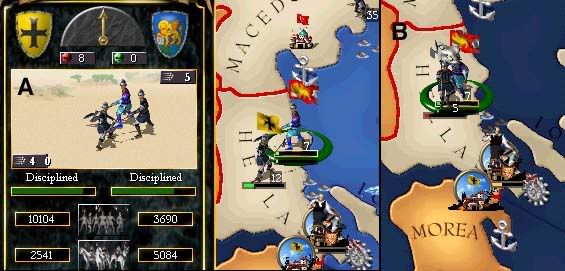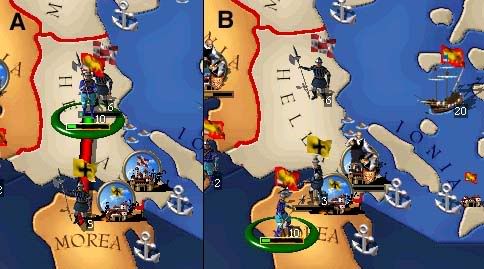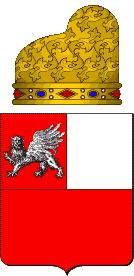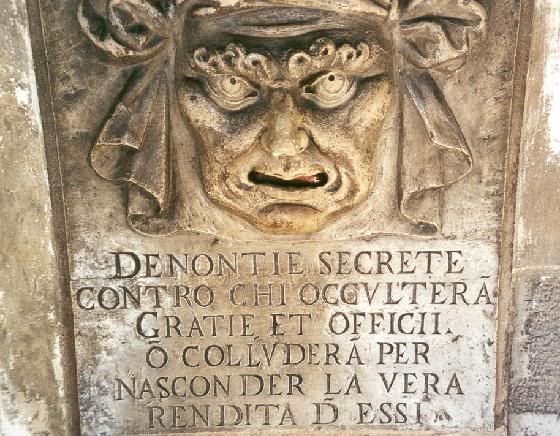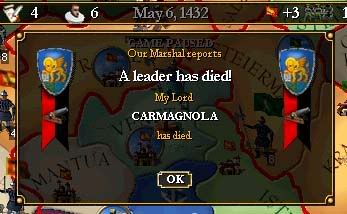[size=+1]The Trial of Carmagnola[/size]
Historic Background
The successful campaigns of Philippo Maria Visconti of Milan had Venice worried. Florence was being defeated battle after battle, Zagonara, Val di Lamone, Rapallo, Anghiari. Doge Foscari wanted the war, but the council was doubtful because they feared an alliance between Visconti and Sigismund of Hungary. Finally the desperate Florentines sent Venice a plead that was also a threat: "When we refused to help Genoa, she made Visconti her Lord. If you refuse to help us, we will make him King." This threat, plus the defection of count Carmagnola, who claimed that he could defeat Visconti's armies, turned the scale to the doge's position. The Florentine League was concluded and Carmagnola was made "Capitano Generale della genti di terra" of Venetian forces.
The first campaign ended in the acquisition of Brescia and the Bresciano by Venetian troops, but not by Carmagnola. He had no sooner brought his forces under Brescia than he asked leave to retire for his health to the Baths of Abano; and his conduct from the very first roused suspicions. The second campaign gave Bergamo to the victorious Republic. But the suspicions of Venice were increased by finding that the Duke of Milan was in communication with Carmagnola and was prepared to conclude a peace through him as intermediary, suspicions confirmed by the dilatory conduct of their general after the victory at Maclodio (1427), when nothing lay between him and Milan. At the opening of the third campaign against Visconti, the Republic endeavoured to rouse their general to vigorous action by raising his emoluments and promising him immense fiefs including the lordship of Milan, if he would only crush the Duke and take his capital. But it was to the interest of Carmagnola, as indeed to all other soldiers of fortune, to make the operations last as long as possible, to avoid decisive operations, and to liberate all prisoners quickly. At the same time Carmagnola was perpetually receiving messengers from Visconti, who offered him great rewards if he would abandon the Venetians. The general trifled with his past as with his present employers, believing in his foolish vanity that he held the fate of both in his hand. But the Venetians were dangerous masters to trifle with, and when they at last lost all patience, the Council of Ten determined to bring him to justice. Summoned to Venice to discuss future operations on the 29th of March 1432, he came without suspicion. He was received with marked honour. His suite was told that the general stayed to dine with the Doge and that they might go home. The Doge sent to excuse himself from receiving the Count on the score of indisposition. Carmagnola turned to go down to his gondola. In the lower arcade of the palace he was arrested and hurried to prison. He was brought to trial for treason against the republic.
The Trial
This is a transcription of the trial that took place in the Democratic AAR (see previous post). It includes edited posts from the following forum members:
Cast by order of appearance:
[lawkeeper]: Senator Dandolo, acting as il rosso (red) inquisitore from the Dogal Council.
[Fodoron]: Senator Jacopo Loredano, in charge of the accusation
[Carmagnola]: Senator Gabriele Mocenigo, acting as il nero (black) inquisitore from the Council of Ten.
[Fodoron]: Capitano General Fodoroni
[Norrefeldt]: Senator Barbarigo, from the Council of Ten.
[Fodoron]: Doge Francesco Foscari
[carlec]: Senator Carlo Cornaro, from the Council of Ten.
[Daniel A]: Senator Daniel A, from the Council of Ten.
[Fodoron]: Minister of Economy
[aegandolfi]: Senator Arturo Gandolfi, acting as il nero (black) inquisitore from the Council of Ten.
Setting: In the Inquisitorial hall at the dogal palace in the piazza St. Marks of Venice. The "Supremo Terribile Tribunale" is composed by three Inquisitors. Their goal is to assure the security of the State, and their power is above the doge or any other person in the republic. Chosen between the Dogal Councillors, senator Dandolo is "il rosso", the first inquisitor dressed in red. Sitting at both sides of "il rosso", chosen from the Council of Ten, and dressed in black, are "il neri", senators Mocenigo, and Gandolfi. In front of the tribunal sits the accused, count Carmagnola, the witnesses, the accusation, the defender and the members of the Quarantia, forty senators.
Dandolo: Citizens of the Serennissima Repubblica,
As Primo Inquisitor, Il Rosso, I formally declare this sitting of the Supremo Terribile Tribunale open. I will be assisted by Il Neri Inquisitori Mocenigo and Gandolfi, and we will jointly preside the Quarantia. The first step will consist on the denouncement by senator Jacopo Loredano.
Loredano: I denounce Francesco Bussone, count of Carmagnola on charges of treason during war, and conspiracy with the enemies of the republic. I denounce doge Francesco Foscari on charges of abuse of authority, usurpation of council powers and misuse of public funds.
May 1432. Carmagnola's trial.
Option A Execute Carmagnola: +30 ducats, Land -1, Quality -1
Option B Release Carmagnola: Land -1, Quality -1
Option C Retain Carmagnola: -100 ducats, Stability -1, Monarch DIP -3 for 12 months, Trigger Carmagnola's acquitted event.
-------------------
Dandolo: We hear the denouncement. Lets now hear the testimonies exposed to this court. Commissioner to the armies Enrico Donato and Balio at Constantinople Marino Zen are not present in Venice, but we have already read their letters (see posts above). Other witnesses and interested parties please speak.
Mocenigo: Most Serene Doge, Noble Senators,
While the senators talked, the enemy has stricken. Nay, look not east at the Turks. The worst enemy is within our walls. A conspiracy threatens the very foundation of this Republic. Men of power and influence, meeting in dark chambers, commanding the blind loyalty of our armies and provincial officials, would take from this assembly all its powers. Powers that our fathers saw fit to divide among many, to protect our freedom.
They will have us believe that we are in danger; that decisions must be made swiftly, that action cannot wait for the deliberation of the Senate. Before long, this august body will only be asked to simply approve decisions made elsewhere. Already, we are presented with a fait accompli, the war against the Visconti, are we not?
And we are supposed to be pleased, since it went so well, looking the other way as war and peace were made without even one senator knowing. It was a unique opportunity, we are told; our armies had to strike in secret, to achieve surprise; this decision was already implied by our previous choices. On and on, there are many such reasons.
And now, these conspirators try to cloud our judgment with rumors of Carmagnola’s treason, so that we may be led to blame him for this hasty enterprise. But this Senate is not made up of fools!
No, I shall not declare myself pleased with this war, however well our Captain General Fodoroni seems to think it went. The timing was exceedingly wrong, as events are proving. What is a small land gain in the west, when the Turks threaten our very existence in the east? What is the humiliation of Milan, when those lands, left without allies or protection, are now to fall into greedy, foreign hands, so that we may have to face a stronger enemy than Milan would ever have been? What shall happen, now that the despicable Tyrolese have taken advantage of Milan’s weakness?
Do you not see the wisdom of Carmagnola, who did not want to weaken that power beyond our interest? Is it treason to consider all the consequences of rash actions? Perhaps he showed his faith more to us, the Senators of the Republic, than to the Doge and that is why we now hear such baseless accusations from this Enrico Donato, whose affiliations we know very well.
Beware of the Doge, noble senators, not Carmagnola, if you must beware of a man! I formally propose that doge Foscari be censored for his lack of respect to the principles of the Republic, and this investigation should ascertain whether his actions proceed from darker counsels, rather than a mere inadvertence.
Yet, in our present plight, we must not be divided within ourselves, nor can we afford to lose the services of the Captain General Carmagnola. Indeed, he must be commended at least for one of his actions: his rescue of Constantinople from the Turks, knowing the opinion of many among us. If today we can protect our byzantine friends from the black hearts of those Turks instead of praying for their souls is because of this man alone.
Fodoroni: Supreme Tribunal, serene Doge, noble senators,
As chief commander of the venetian armies, I find suspicious how long it took the campaign against Milan. We were far superior, yet the war lasted for over two years, but even worse, count Carmagnola received several personal envoys from Visconti, and we have witness accounts on generous offers from Visconti to stop or at least delay the war. Then we have the issue of the war against the Despot of Morea. That war lasted two and a half years. Against a tiny enemy that could easily be defeated in less than six months. We must add the dishonor to us that our ally, the duke of Athens had to conquer Mystra with inferior forces to ours, because Carmagnola refused to do it himself.
Barbarigo: Senators,
Carmagnola is gifted and dangerous. He has tried to manipulate his employers, both us and the Visconti. Only the vigilance of our spies in his court made us see clear what a wolf he is. We cannot afford to risk having him slip a knife in our back or his hands deeper into our coffers. He's a condottieri, in the future, he could join the enemies of our Republic.
Foscari: Supreme Tribunal, senators,
Visconti is now dead, and we mock him, yet we must not forget that Carmagnola came to us in times of need. Visconti was then unstoppable, ransacking Tuscany, subduing Genoa. Soon it was going to be our turn. Yet this man offered his help. And his help we accepted. Some will say we paid for his victories, and to that I will answer that we paid only for his fights. Some will say he could have done more, and to that I will answer that he could have achieved a lot less. I myself have doubts about him. But I also have doubts about myself and about these noble senators. Visconti was a twisted man and Carmagnola's family lived in his dominions. Perhaps Carmagnola did everything he could to help us or perhaps not. But for the help that indeed he delivered I will plead that this tribunal releases Carmagnola on his word that he will retire forever from active duty.
Mocenigo: Most Serene Doge, Noble Senators,
I speak before you today to offer you a choice. Whether you want to be proud of the Republic, defend its freedoms against creeping tyranny, and keep her armies strong and ready to face our present dangers. Or walk in shame, knowing you have sold your honor for the protection of powerful and shady men, while leaving the gates wide open to our enemies in the east and north.
I have been appointed to speak on Count Carmagnola's defense. In fact, I can hardly descry what he should defend himself from, so shady and incongruous the accusations are. What is clear to everyone, instead, is that all the accusations against count Carmagnola can one way or the other be traced back to the Doge and his acolytes. And it is patent that he has raised this commotion only to distract us from his disastrous handling of our western policy.
What is exactly the damage that this valiant condottiero has caused to our Republic, I ask. Can anyone point to anything detrimental that proceeded from his actions? Indeed, this session would scarcely be sufficient to enumerate the services he has rendered to us, to the Republic. As senator Barbarigo asked, is this the way Venice treats her truthful servants?
He stands accused of putting honor above mean-spirited counsels in the war against Milan, for having released brave prisoners. What was the alternative? Do these senators want to be known as the proud heirs of the Roman Senate, or as a band of shameless ruffians, ready to trample their principles for the slightest advantage?
Advantage that is for no one to be seen, in any case. Are the banners of Friedrich of Tyrol flying over Milan not enough a demonstration that the Visconti were not to be left totally destitute of military might?
He stands accused of unnecessary delays during the Greek campaign. It would be ludicrous, if it weren't tragic. The most brilliant military strategist and tactician in Europe is accused of incompetence by this Marino Zen, someone who has never been within 10 leagues of a battlefield, and whose sole skill is adulation of our Captain General Fodoroni. Please, my fellow senators, do not refrain from a loud laughter; it is much needed.
I call for the immediate acquittal of count Carmagnola, and I propose a generous compensation be offered to him (100 d, only 3 months’ revenue), in the hopes that it might persuade him to forget this humiliating incident and he might remain in our service. While this may cause displeasure to those that are weaving dark webs behind our backs (stab –1), the cost of raising the quality of our troops to the same standards of excellence would be just as great. And with the upcoming struggle in the east, we cannot afford at the moment to forsake our armies and concentrate on the navy.
Cornaro: It is still with a heavy heart that I think of how family matters pressed me to missing this critical decision the first time. We clearly saw how his actions almost cost us a crucial gain in the war in the Balkans. He must be made an example of!
Daniel A: Regarding the accusations of public funds misuse by the Doge, it is the talk of the marketplace. Even my family's merchants complain that their profit doesn't even cover the expenses. The city loses money on this and yet we lose huge shares of markets in foreign places. Perhaps even 30%. Is the Doge responsible for this?
Minister of Economy: Noble senators,
A question has been raised about the wiseness of expending funds from our treasury to pay the travel and installation costs for our merchants. To help clarify this issue that certainly is a little bit over the head of our current doge, I have been asked to give you the following report:
It has been extensively said that once one reaches level 3, it is the time to start trading. That usually happens around 1500-1540 for most human countries. Our Republic has already a trade efficiency over level 3, currently at 54%. We are the most advanced traders in the world. However, two factors from this early age should also be taken into consideration. One is that the high number of nations provide for a fiercer, more competitive environment, and the other is that being our economy smaller, merchant costs represent a comparatively higher part of our income. We do not raise enough money from census taxes to pay for the cost of sending all the merchants available to us, and that is even if we do not have other expenses to cover, like armies, promotions or gifts.
In 1419 we started with 14 merchants. We made an expense of 246D in merchants for the period 1419-1425, sending 31 merchants and placing 22. In that period 7 merchants were lost, bringing the final number to 29. We increased our trade revenue for the period in an estimate 182D with respect to not sending merchants. But the surviving merchants will continue making a revenue in future periods at a rate of about 4D/year each. We can estimate that using the 1425-1431 period when merchant loses were higher and very little placement was done. That comes out at 324D, only for the merchants placed between 1419 and 1425, with an estimate of 9 merchants from the 22 we placed in that period still making money in 1431, versus only 6 from the original 14. In the end we will probably be making 2D in research for every 1D spent in merchants.
This letterbox in the wall of the ducal palace is for secret denounces. On the other side it has three locks to ensure the secrecy as it can be open only by the three inquisitors.
-------------------
: We have heard the testimonies and the accusation and defense pleads. It is time to vote on the culpability and on the penalty requested by the advocates of the Commune before we reach a verdict and dictate the sentence. I will remind to all the accusations.
Doge Francesco Foscari is accused of abuse of authority for declaring war to Milan, usurpation of council powers in dictating the foreign policies of the Republic, and misuse of public funds in his trade strategies. If found guilty the punishment can go from being reprimanded to being asked to resign.
Count Carmagnola is accused of treason for corresponding with the Republic enemies and acting in war against the interests of the Republic. If found guilty the penalty can only be of death. If found innocent we must decide if we retain his services or we dismiss him.
The judgement of the Supremo Terribile Tribunale
Hear ye the pronouncement of
Gabriele Mocenigo, Il Nero Inquisitore
Preamble: While the prosperous exercise of the of the business of government requires that internal divisions be kept to a minimum, all senators of the ancient city of Rome remained ever watchful against one man acquiring too much influence and power, lest their republican government be turned into a monarchic rule. History teaches that when that watchfulness gave way to complacency and the sole pursuit of riches in that glorious city, tyrants rose in might amidst much blood. If we are not to let that happen to our own Republic we must tolerate civil discord to avoid civil war.
After gathering proofs and hearing testimonies, we cannot ignore that dangerous and despotic tendencies have demonstrated themselves in our civil and military administrators. Yet, because of the senators' watchfulness they have not had the opportunity to grow into more serious threats. Therefore:
In the name of St. Mark,
Judgement: I find Doge Francesco Foscari guilty of overextending his authority in declaring war without the consent of Senate. On the counts of usurpation of senatorial powers, and of misuse of public funds to suport trading policies, no sufficient evidence could be found to my satisfaction.
Though the penalty is to be decided solely by il Rosso Inquisitore, I ask that the Doge be reprimanded for his conduct and that, as a retribution for endangering our Republic, his estates west of Padua be confiscated.
I find count Carmagnola innocent of all charges, and ask the Senate that he be acquitted and a 100 D compensation be paid to him for the slander on his person, so that we may retain his services.
Il Nero of the Supremo Terribile Tribunale has spoken.
The judgement of the Supremo Terribile Tribunale
Hear ye the pronouncement of
Arturo Ernesto Gandolfi, Il Nero Inquisitore
We are all committed to the principles of the Republic, and none of us wants to see and undue concentration of power. However, there will be times when the Doge must act decisively to safeguard the Republic. If the Doge has no latitude, why have a Doge in the first place. The war against Milan had a just casus belli, and our claim on Mantua was internationally recognized. Furthermore, the Senate had indicated a desire to seek war with Milan. Therefore,
In the name of St. Mark,
Judgement: I find Doge Francesco Foscari innocent of all charges against him.
In the conduct of the Milanese war, and the subsequent liberation of Constantinople, our general Carmagnola acted against the interests of our Republic, and corresponded with our enemies.
Judgement: I find Count Carmagnola guilty.
May God have mercy on his soul.
Il Nero of the Supremo Terribile Tribunale has spoken.
The judgement of the Supremo Terribile Tribunale
Hear ye the final judgement of the Supremo Terribile Tribunale by
Lawkeeper Dandolo, Il Rosso Inquisitore
Citizens of the Serenissima Repubblica, hear the final judgement of the Terribile Supremo Tribunale,
On the charge of high treason sustained against Count Carmagnola, former general of the Repubblica, the Supremo Terribile Tribunale,
Considering that witnesses, not one but several, each of them as trustful as can be, have testimonied that the extended duration of the wars, not only against Visconti's Milanese state, but also against the so-called Byzantine Empire, was the result of the direct orders of the fore-mentionned Count Carmagnola,
Considering that such a behaviour of freeing the prisoners without any guarantee, is a behaviour of the past ; that the Repubblica has turned itself to the future, and does not take delight in obsolete ways ; that the said released prisoners immediately took back the arms against us, persevering in the service of tyranny ; that such an act was helping the Repubblica's enemy, late Visconti of Milano, to whom the accused person was previously personnally engaged as land-holder ; that late Visconti did not deprive fore-mentionned Count Carmagnola from his lands and titles,
Considering that the war against the greek despots of Morea could have been ended half-a-year earlier than it did ; that during all this time, the fore-mentionned Count Carmagnola took his quarters far from the field of battle ; that such an act, meaning stepping away from an undersized enemy, is both an act of cowardice and a proof of tactical ineptness,
Considering that the Serenissima Repubblica's soldiers should show loyalty to the Repubblica, bravery in the face of danger and outstanding tactical skills ; that such loyalty, bravery and skills should be raised and supported by the example given by their officers ; that the accused person was found lacking in all three,
Considering that the inner feeling of the majority of the Magistrates is that the accused person was faulty in his duties,
Considering that the only penalty for this most heinous crime of high treason against the interests of the Serenissima Repubblica is the penalty of death,
Decides, in soul and consciousness, that the accused person is found guilty of the crime of high treason, and as such is condemned to the penalty of death,
Considering that the infamy of the crime of high treason is incompatible with the highest ideals of the nobility,
Considering that the Serenissima Repubblica is to be assimilated to the Pater Patriae, that the heinous crime of high treason is to be assimilated to the murder of the father ; that such an act puts the convict in contradiction to the Sacred Faith,
Decides that the convict is stripped of all noble titles, that his holdings and possessions are to be confiscated, that the sentence of death will be executed by mere hanging, that his body will be burned and the ashes, scattered.
On the charge of high treason sustained against Doge Francesco Foscari, the Supremo Terribile Tribunale,
Considering that the Senate endorsed the hiring of the fore-mentionned Count Carmagnola ; that the responsibility of one should not extend to the act of others, except when specifically stated,
Considering that the Doge Foscarini faithfully reported all accounts of bad behaviour on the part of Count Carmagnola, through the services of the most loyal servant of the Serenissima Repubblica, signor Fodoroni,
Considering that, as previously said, the Senate endorsed, and even suggested, the hiring of the fore-mentionned Count Carmagnola ; that our office, the Supremo Terribile Tribunale, has not the competency of judging the Senate ; that it is our belief that such separation of the Powers will, in the times to come, be recognized as the basis of true democracy,
Considering that what the Senate decides, is not in the power of the Tribunale to outdo ; that prosecuting against a man who was respecting the Senate's decision, be it a simple citizen or the Doge himself, would be both discriminatory and unwise,
Considering that war, as well as peace, is a question of politics ; that this Tribunale should not, in the name of the separation of the Powers, be responsible of the trial of politic matters ; that politics is the realm of the Senate and of the Doge,
Decides that all all charges against Francesco Foscari, Doge of the Serenissima Repubblica, Arm of the Senate, are to be dropped, and his reputation and fame restored,
Advises that, in the times to come, the Senate handles itself all matters of politics,
Written and proclaimed this day, in the city of Veneto, under the guidance of St-Mark,
On the behalf of the Supremo Terribile Tribunale of the Serenissima Repubblica,
Prime Inquisitor Lawkeeper Dandolo, Il Rosso
The judgement of the Quarantia on Carmagnola
Dandolo: Guilty
Mocenigo: Innocent, retain.
Gandolfi: Guilty
Barbarigo: Guilty
Cornaro: Guilty
Dandolo: Hear ye the sentence. This tribunal condemns Carmagnola to be executed by beheading on the morning of the 5th of May of this year of 1432, publicly in the piazza St. Marks. May God have mercy on his soul.
